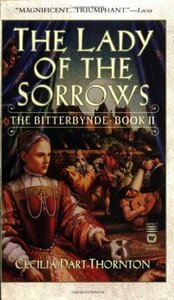You need to sign in or sign up before continuing.
Take a photo of a barcode or cover
adventurous
dark
hopeful
mysterious
slow-paced
Plot or Character Driven:
A mix
Strong character development:
Complicated
Loveable characters:
Yes
Diverse cast of characters:
Yes
Flaws of characters a main focus:
No
(7.71 on CAWPILE)
Having enjoyed the first book in the series, despite the slow pacing I was excited to continue on to this next instalment. Hoping for this extensive world to open up even more as I went on. It did indeed deliver on my hopes for this sequel I am happy to say.
The plot intensifies and the stakes enhance in this wonderful sequel. I very much enjoyed the direction it took not only this particular novel but where it steered the rest of the story to go.
We are introduced to new characters as well as still reading along our protagonists from the first book. They continue to grow and come into their own as the plot progresses in a very organic and gentle way.
If you didn’t get on well with the writing in the first book then not much has changed from one instalment to another. However if you were a fan of book one you will be happy to hear it is a very consistent sequel.
As the world begins to grow and open up we receive more revelations and stakes throughout the series. This growth comes steadily and increasingly over the course of this instalment.
Overall this was a great sequel and a very faithful successor to book one.
Having enjoyed the first book in the series, despite the slow pacing I was excited to continue on to this next instalment. Hoping for this extensive world to open up even more as I went on. It did indeed deliver on my hopes for this sequel I am happy to say.
The plot intensifies and the stakes enhance in this wonderful sequel. I very much enjoyed the direction it took not only this particular novel but where it steered the rest of the story to go.
We are introduced to new characters as well as still reading along our protagonists from the first book. They continue to grow and come into their own as the plot progresses in a very organic and gentle way.
If you didn’t get on well with the writing in the first book then not much has changed from one instalment to another. However if you were a fan of book one you will be happy to hear it is a very consistent sequel.
As the world begins to grow and open up we receive more revelations and stakes throughout the series. This growth comes steadily and increasingly over the course of this instalment.
Overall this was a great sequel and a very faithful successor to book one.
adventurous
challenging
emotional
inspiring
mysterious
tense
slow-paced
Plot or Character Driven:
Character
Strong character development:
Yes
Loveable characters:
Yes
Diverse cast of characters:
No
Flaws of characters a main focus:
Yes
Wow, this one had some wild twists and turns in it! I really enjoyed this novel. It's a great fantasy romp through an interesting world, it continues an intriguing tale from the first novel and WOW does it through some curveballs. The big reveal of who Rohain really is, that comes at the end of the novel, was just so unexpected and such an interesting story. I started reading the third book straight away because I just need to know what happens. Although one thing I will say: this series is so PG13 it's painful. Give me at least a fade to black or something, you know? Insufficient smooches and romantical entanglements for my liking.
It's slowwwww, golly it's so slow. But the language is superb when it's flowing, and the story is intriguing in parts.
Where it's not, it's kind of torture to read. But worth getting through.
Where it's not, it's kind of torture to read. But worth getting through.
Ok wow ! so many things have happened and I’m enjoying these twists and turns ! I was so happy Irmhein / Rohain found Thorn again, so saddened they have been separated again so I can’t wait to see what happens next between them. All of Irmheins / Rohains memories are coming back after finding her bracelet which have been adventurous .
Star Rating Breakdown
1 ⭐️ - Terrible. DNF.
2 ⭐️ - Average. I finished it but that's all I can really say about it.
3 ⭐️ - Good. Not a prize winner but the story was engaging enough to keep me interested.
4 ⭐️ - Great Book. Thoroughly enjoyed it.
5 🌟 - BEST. THING. EVER. Read this NOW!
1 ⭐️ - Terrible. DNF.
2 ⭐️ - Average. I finished it but that's all I can really say about it.
3 ⭐️ - Good. Not a prize winner but the story was engaging enough to keep me interested.
4 ⭐️ - Great Book. Thoroughly enjoyed it.
5 🌟 - BEST. THING. EVER. Read this NOW!
Our lead character travels to Court under the name Lady Rohain of the Sorrows and quickly adjusts to Court life - and then makes a discovery about the King, and departs the Court to spend quite a long time on an island where the characters tell each other quite detailed stories (and the narrative slows down quite a bit at this point), and then they depart, and then there's a rather lengthy flashback section. Is that the most convoluted plot summary ever? That's because the plot is quite convoluted. But I enjoyed it, even though I felt it got bogged down a little in the island section.
adventurous
emotional
mysterious
slow-paced
Plot or Character Driven:
Character
Strong character development:
Yes
Loveable characters:
Complicated
Diverse cast of characters:
No
Flaws of characters a main focus:
Complicated
I love the use of old fairy tales and the descriptive language of the story. I did have to pull out the dictionary a few times though.






